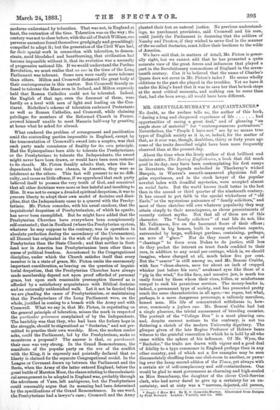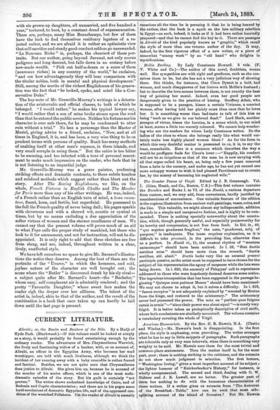MR. GRENVILLE-MURRAY'S ACQUAINTANCES.* No doubt, as the preface tells us,
the author of this book, MR. GRENVILLE-MURRAY'S ACQUAINTANCES.* No doubt, as the preface tells us, the author of this book, " during a long and chequered experience of life had opportunities of seeing a great deal," and of gleaning "an ample store of material" for " contemporaneous portraiture." Nevertheless, the " People I have met " are by no means true types of English society as it is, or, indeed, for the matter of that, as it ever was, though, doubtless, thirty or forty years ago some of the traits described might have been more frequently observed than at the present day.
About the time when the lively author of that brilliant and incisive satire, The Roving Englishman, a book that did much good in its day. may have been contemplating his first essays in literature, the legends embodied in Thackeray's wicked Marquis, in Warren's smooth-mannered physician full of grim experiences, and in the stock lawyer of the popular novelist laden with dreadful mysteries, were accepted almost as social facts. But the world knows itself better in the last than in the second or third quarter of the nineteenth century. It has ceased to put faith in the special wickedness of " old Earls," or the mysterious puissance of " family solicitors," and most of these sketches will owe whatever popularity they may attain simply to their amusingness, as clever presentments of recently extinct myths. Not that all of them are of this character. The " family solicitors " of real life do not, like Mr. Vellnmson, live on the basement floors of their offices ; but dwell in big houses, built in sunny suburban aspects, surrounded by large, well-kept gardens, containing, perhaps, an acre of " glass." Nor do they resort to a species of " chantage " to force even Dukes to do justice, still less do they pocket the interest on trust funds confided to their care, in addition to any usual per-tentage, which is, we should imagine, where charged at all, much below five per cent. But the " usurer" is still among us, and Mr. Benoni Crabbe, with face " clean-shaven, save for about an inch of cropped whisker just before his ears," awakened eyes like those of a " pig in the wind," fox-like face, and massive jaw, is much too easily found by those whom their vices, follies, or misfortunes compel to seek his pernicious services. The money-lender is, indeed, a permanent type of society, and has presented pretty much the same characteristics in all ages,—no rogue, but what, perhaps, is a more dangerous personage, a callously merciless, honest man. His life of concentrated selfishness is, how- ever, commonly a joyless one. Mr. Benoni Crabbe had but a single pleasure, the trivial amusement of breeding canaries. The portrait of the " College Don " is a most pleasing one, and, despite current notions to the contrary, is not too flattering a sketch of the modern University dignitary. The glimpse given of the late Regius Professor of Hebrew bears witness to the grateful veneration in which he is held by all who came within the sphere of his influence. Of Mr. Wyse, the " Bachelor," the traits are drawn with vigour and a good deal of fidelity to a type commoner in England perhaps than in any other country, and of which not a few examples may be seen disconsolately shuffling from one club-room to another, or yawn- ing over the damp second edition of the Times, yet always with a certain air of self-complacency and self-containedness. One would be glad to meet governesses as charming and high-Bolded as Miss Beauchamp, the daughter of the clever Civil-Service clerk, who had never dared to give up a certainty for an un- certainty, and at sixty was a " nervous, dejected, old person, • People I Have Het. By B. C. Grenville-Mnrray. Illustrated from Designs by Fred. Bernard. London : Vizetelly and Co. 1883. with six grown-up daughters, all unmarried, and five hundred a year," tortured, to boot, by a constant dread of superannuation. There are, perhaps, many Miss Beauchamps, but few of them have the luck to find themselves residuary legatees of a re- jected suitor, and we are afraid it is rather an optimistic view that self-sacrifice and steady good-conduct seldom go unrewarded. "Le Nouveau Riche" is, perhaps, the cheeriest of these por- traits. But our author, going beyond Juvenal, not only scorns pedigrees and long descent, but falls down in an ecstasy before new-made wealth. "Pick out half-a-dozen or a score of them [nouveaux riches] in any country of the world," he exclaims, "and see how advantageously they will bear comparison with the titular nobles, both in mental and physical development." Still, among the merits of the richest Englishman of his genera- tion was the fact that " he looked, spoke, and acted like a Con- servative Duke."
The key-note of Mr. Grenville-Murray's writings is a detesta- tion of the aristocratic and official classes, to both of which he belonged. "I would rather," he makes his typical lawyer say, "I would rather that a son of mine broke stones upon the road than that he entered the public service. Neither his fortune nor his character is ever safe there, for he may be condemned to utter ruin without a trial." No less a personage than the Master of Muriel, giving advice to a friend, exclaims, "Now, and at all times in England, it is, and has been, a very wise thing to be on prudent terms with persons of quality. Rank has many methods of exalting itself at other men's expense, in these islands, and very small scruple in using them." But the satire is too bitter to be amusing, and too infected with a tone of personal resent- ment to make much impression on the reader, who feels that he is not listening to an impartial judge.
Mr. Grenville-Murray was a genre painter, preferring striking effects and dramatic contrasts, to those subtle touches and subdued methods which suggest rather than blurt out the story. After The Roving Englishman, we like, on the whole, French Pictures in English Chalks and The Member for Paris more than any of his other writings. He was, indeed, of a French rather than an English turn of mind, a beau racon- teur, fluent, keen, and fertile, but superficial. He possessed to the full the French quality of never being dull ; his pages sparkle with cleverness and with a shrewd wit, caustic or cynical at times, but by no means excluding a due appreciation of the softer virtues of women and the sterner excellences of men. We cannot say that the present volume will prove much of an aid to what Pope calls the proper study of mankind, but those who look to it for amusement, and not for instruction, will not be dis- appointed. It is only right to add that these sketches are free from slang, and are, indeed, throughout written in a clear, lively, unaffected style.
We have left ourselves no space to give Mr. Barnard's illustra- tions the notice they deserve. Among the best of them are the
portraits of the "Usurer," in which the keenness, and cold, joyless nature of the character are well brought out ; the scene where the "Butler" is discovered drunk by his sly rival— a subject quite after Mr. Barnard's heart—the " Bachelor," whose easy, self-complacent air is admirably rendered ; and the pretty " Favourite Daughter," whose sweet face makes the reader sigh the deeper over her silliness. The talent of the artist is, indeed, akin to that of the author, and the result of the combination is a book that once taken up can hardly be laid down until the last page is perused.



































 Previous page
Previous page